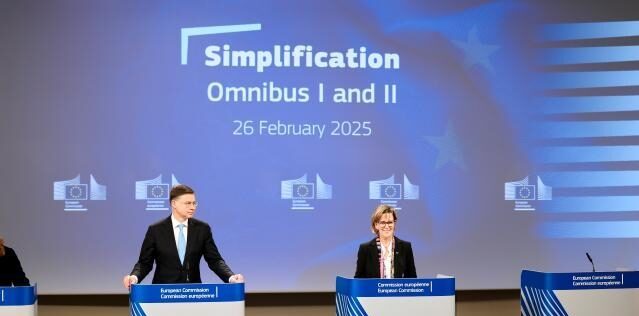Find all related Progressive Post
Progressive Post

The European Commission has presented its work programme for 2025. Not least for those whose brains have long been martyred by arcane and lengthy EU procedures, the prospect of ‘A Bolder, Simpler, Faster Union’ is enticing. But can the KISS – keep it simple stupid – principle be overdone? And is simplification really what Europe needs?
The first annual work programme of a new mandate offers a guide to the direction the European Commission, under its new, old leader Ursula von der Leyen, intends to take. And after the rightward shift in the European Parliament and the Council, a change of tone and substance from the rather progressive approach taken in many areas by the von der Leyen I Commission was inevitable. Yet the Draghi Report of 2024 had set out a largely sound analysis and an ambitious policy agenda that centred on the need to very substantially boost private and public investment. Even though the measures proposed were sometimes questionable and certainly incomplete – the refusal to tackle the still inadequate fiscal rules being the most egregious case – if the report as a whole had served as the basis for the Commission work programme, then one could be cautiously optimistic about the prospects for Europe meeting its many challenges.
Unfortunately, though, while the Commission president frequently cites the report, something significant has gotten lost in translation. References to the need to boost investment have been substantially pared back. On the other hand, the deregulation and simplification agenda, which did form one pillar of Draghi’s recommendations, has seemingly become the foundation.
Front and centre, namely, are a set of so-called ‘omnibus’ proposals to simplify legislation which, with other initiatives, are supposed to reduce the regulatory burden on companies by a very substantial 25 per cent (35 per cent for SMEs). A new ‘small mid-cap’ category will exempt all but large firms from some requirements. Permit granting, authorisations and reporting requirements are to be streamlined. A renewed focus on the implementation of existing EU law is promised with the drawing up of – how could it be otherwise? – ‘implementation roadmaps’. The already presented Competitiveness Compass also leans heavily on deregulation efforts.
Simple is better than complex. Regulatory duplication and incoherence should be expunged. There is an argument that the EU, lacking the sort of budgetary resources typical of a federal-level authority, has engaged in overregulation. Yet there are two serious dangers.
Regulation guides the decisions of economic and social actors to achieve the desired objectives of public policy. In so doing it corrects market outcomes based on individual decisions. This is always politically contentious. The first risk, then, is that, under the guise of simplification, the pursuit of public policy goals will be weakened. Market outcomes – which are often based on distorted prices and are affected by all kinds of informational and power asymmetries – will come to dominate. How big the risks are here is hard to judge from a declaratory document such as this. But the promised simplification of REACH, the legislation governing the registration, evaluation and authorisation of chemicals, in the interest of competitiveness gives a taste of what is at stake. The European Parliament, social partners and civil society organisations will need to be vigilant to ensure that the baby is not thrown out with the bathwater and social, environmental and health risks are avoided.
The second risk is more serious, however. Focusing on a simplification/deregulation agenda makes a promise that will not be kept, namely that such regulatory measures will really move the dial in achieving the valid goal of raising Europe’s productivity (not to mention other public policy goals, especially rapid decarbonisation). For what is needed to achieve that is, first and foremost, a massive investment offensive, public and private – as Mario Draghi rightly emphasised. Yet if the former ECB President was not forthright enough on the need for reform of the fiscal rules and a genuine fiscal capacity at EU level, the Commission Work Programme drops this entirely. While the word ‘investment’ is mentioned repeatedly (27 times to be precise) it is almost always in an aspirational sense. A notable exception is defence, where new funding options are to be considered. But for the rest, the hope is that simplification, a savings union and new roadmaps will induce Europe’s companies to raise their pace of capital accumulation.
But this will not happen. Firms already in the market invest when their existing capacities are insufficient to meet expected demand for their products. As long as the latter remains weak or highly uncertain, they will not expand capacity. There is a case of easing requirements on new, innovative firms; but here, too, a proper risk assessment is needed.
There is an irony here. A lack of budgetary resources has led the EU level to focus on regulation as a means to achieve policy goals. Still unwilling or unable to increase fiscal capacity to deliver public goods for European citizens, the hope now appears to be that deregulation will do the trick.
But the transformation of Europe’s economic model needed to render it productive and sustainable in the face of all the challenges duly mentioned by the Work Programme means Europe putting its money where its mouth is. Partly deficit-financed, but in part also through higher taxes, restraining household consumption, public authorities, at federal and national levels, need to invest in critical physical and social infrastructure. And they need to provide substantial subsidies for households and the corporate sector to invest where there is not yet a business case to do so. And they need to find resources to compensate and support those bearing the brunt of needed structural changes, preventing the drift to populism and a backlash against decarbonisation. Against such a favourable background, private businesses will invest – with or without a capital markets union – as they did in the past.
That is not everything, but it is the core of the genuinely bolder, simpler, faster Union that Europe needs.
Photo credits: European Union 2025 – Source : EP
| Cookie | Duration | Description |
|---|---|---|
| cookielawinfo-checkbox-advertisement | 1 year | Set by the GDPR Cookie Consent plugin, this cookie is used to record the user consent for the cookies in the "Advertisement" category . |
| cookielawinfo-checkbox-analytics | 11 months | This cookie is set by GDPR Cookie Consent plugin. The cookie is used to store the user consent for the cookies in the category "Analytics". |
| cookielawinfo-checkbox-functional | 11 months | The cookie is set by GDPR cookie consent to record the user consent for the cookies in the category "Functional". |
| cookielawinfo-checkbox-necessary | 11 months | This cookie is set by GDPR Cookie Consent plugin. The cookies is used to store the user consent for the cookies in the category "Necessary". |
| cookielawinfo-checkbox-others | 11 months | This cookie is set by GDPR Cookie Consent plugin. The cookie is used to store the user consent for the cookies in the category "Other. |
| cookielawinfo-checkbox-performance | 11 months | This cookie is set by GDPR Cookie Consent plugin. The cookie is used to store the user consent for the cookies in the category "Performance". |
| csrftoken | past | This cookie is associated with Django web development platform for python. Used to help protect the website against Cross-Site Request Forgery attacks |
| JSESSIONID | session | The JSESSIONID cookie is used by New Relic to store a session identifier so that New Relic can monitor session counts for an application. |
| viewed_cookie_policy | 11 months | The cookie is set by the GDPR Cookie Consent plugin and is used to store whether or not user has consented to the use of cookies. It does not store any personal data. |
| Cookie | Duration | Description |
|---|---|---|
| __cf_bm | 30 minutes | This cookie, set by Cloudflare, is used to support Cloudflare Bot Management. |
| S | 1 hour | Used by Yahoo to provide ads, content or analytics. |
| sp_landing | 1 day | The sp_landing is set by Spotify to implement audio content from Spotify on the website and also registers information on user interaction related to the audio content. |
| sp_t | 1 year | The sp_t cookie is set by Spotify to implement audio content from Spotify on the website and also registers information on user interaction related to the audio content. |
| Cookie | Duration | Description |
|---|---|---|
| CONSENT | 2 years | YouTube sets this cookie via embedded youtube-videos and registers anonymous statistical data. |
| iutk | session | This cookie is used by Issuu analytic system to gather information regarding visitor activity on Issuu products. |
| s_vi | 2 years | An Adobe Analytics cookie that uses a unique visitor ID time/date stamp to identify a unique vistor to the website. |
| Cookie | Duration | Description |
|---|---|---|
| NID | 6 months | NID cookie, set by Google, is used for advertising purposes; to limit the number of times the user sees an ad, to mute unwanted ads, and to measure the effectiveness of ads. |
| VISITOR_INFO1_LIVE | 5 months 27 days | A cookie set by YouTube to measure bandwidth that determines whether the user gets the new or old player interface. |
| YSC | session | YSC cookie is set by Youtube and is used to track the views of embedded videos on Youtube pages. |
| yt-remote-connected-devices | never | YouTube sets this cookie to store the video preferences of the user using embedded YouTube video. |
| yt-remote-device-id | never | YouTube sets this cookie to store the video preferences of the user using embedded YouTube video. |
| yt.innertube::nextId | never | This cookie, set by YouTube, registers a unique ID to store data on what videos from YouTube the user has seen. |
| yt.innertube::requests | never | This cookie, set by YouTube, registers a unique ID to store data on what videos from YouTube the user has seen. |
| Cookie | Duration | Description |
|---|---|---|
| COMPASS | 1 hour | No description |
| ed3e2e5e5460c5b72cba896c22a5ff98 | session | No description available. |
| loglevel | never | No description available. |


